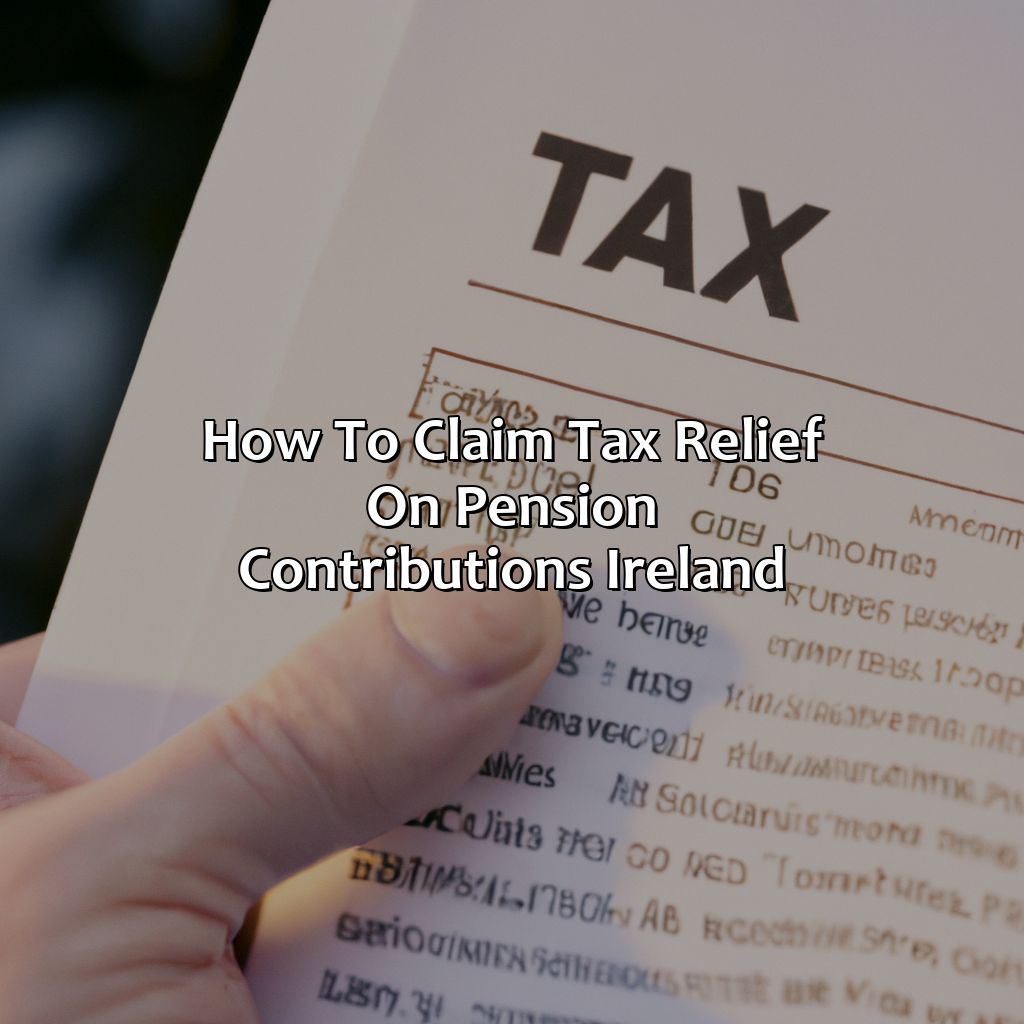How To Claim Tax Relief On Pension Contributions Ireland?
Key Takeaway:
- Understanding tax relief on pension contributions in Ireland: Tax relief on pension contributions is a way of reducing your tax bill by putting money into a pension scheme. In Ireland, there are different tax relief rates depending on your income, age, and other factors.
- Eligibility for tax relief on pension contributions:
- Standard Fund Threshold: The Standard Fund Threshold is the limit on the amount of tax-relieved pension funds that an individual can accumulate during their lifetime. Individuals who exceed this threshold may be subject to additional taxes.
- Age Restrictions: There are age restrictions for claiming tax relief on pension contributions. Generally, individuals under the age of 75 can claim tax relief on contributions to a pension scheme, while those over 75 may be subject to certain limitations.
- How to claim tax relief on pension contributions in Ireland:
- Pension contributions and tax relief rates: The amount of tax relief you can claim on pension contributions depends on your income and other factors. Higher earners may be eligible for more tax relief than lower earners.
- Claiming tax relief through payroll: If you are a PAYE employee, you can claim tax relief on your pension contributions through your employer’s payroll system.
- Claiming tax relief through self-assessment: If you are self-employed or have income from sources other than employment, you will need to claim tax relief on your pension contributions through self-assessment.
- Timeframe for claiming tax relief on pension contributions: You can claim tax relief on pension contributions for any tax year up to four years after the end of that tax year.
- Conclusion: Claiming tax relief on pension contributions in Ireland can be a complex process, but it is worth exploring as a way to reduce your tax bill and save for retirement.
Do you want to save on your taxes? Claiming tax relief on pension contributions in Ireland can help you reduce your tax burden significantly. With this article, you will learn how to do it in a few easy steps.
Understanding tax relief on pension contributions in Ireland
Pension contributions in Ireland come with tax relief benefits that can be confusing to understand. One may wonder how to claim tax relief on these contributions. Essentially, tax relief is a deduction in income tax that you can claim if you contribute to a pension plan. By contributing to a pension plan, the government allows you to reduce your taxable income, which in turn lessens the amount of income tax that you need to pay.
In Ireland, there are a few different ways to claim tax relief on pension contributions. For those with private pensions, it is possible to claim this relief by completing and submitting a tax return to the Revenue Commissioners. This tax return can cover the previous four years and should be completed by October 31st. For those with an occupational pension plan, the employer should claim the tax relief on the employee’s behalf through the company’s payroll.
It is important to note that there is a limit to the amount of tax relief that one can claim on pension contributions. This limit is based on an individual’s age and earnings. Additionally, if an individual is a member of more than one pension plan, the relief limits still apply, and one should consult with their pension provider to ensure that they are not over-contributing.
History has shown that tax relief on pension contributions has been a powerful incentive for many people in Ireland to save for their retirement. However, it is important to understand the process for claiming this relief to ensure that one is taking full advantage of the benefits available. By following the appropriate procedures and seeking guidance where necessary, individuals can reap the rewards of tax relief on their pension contributions.
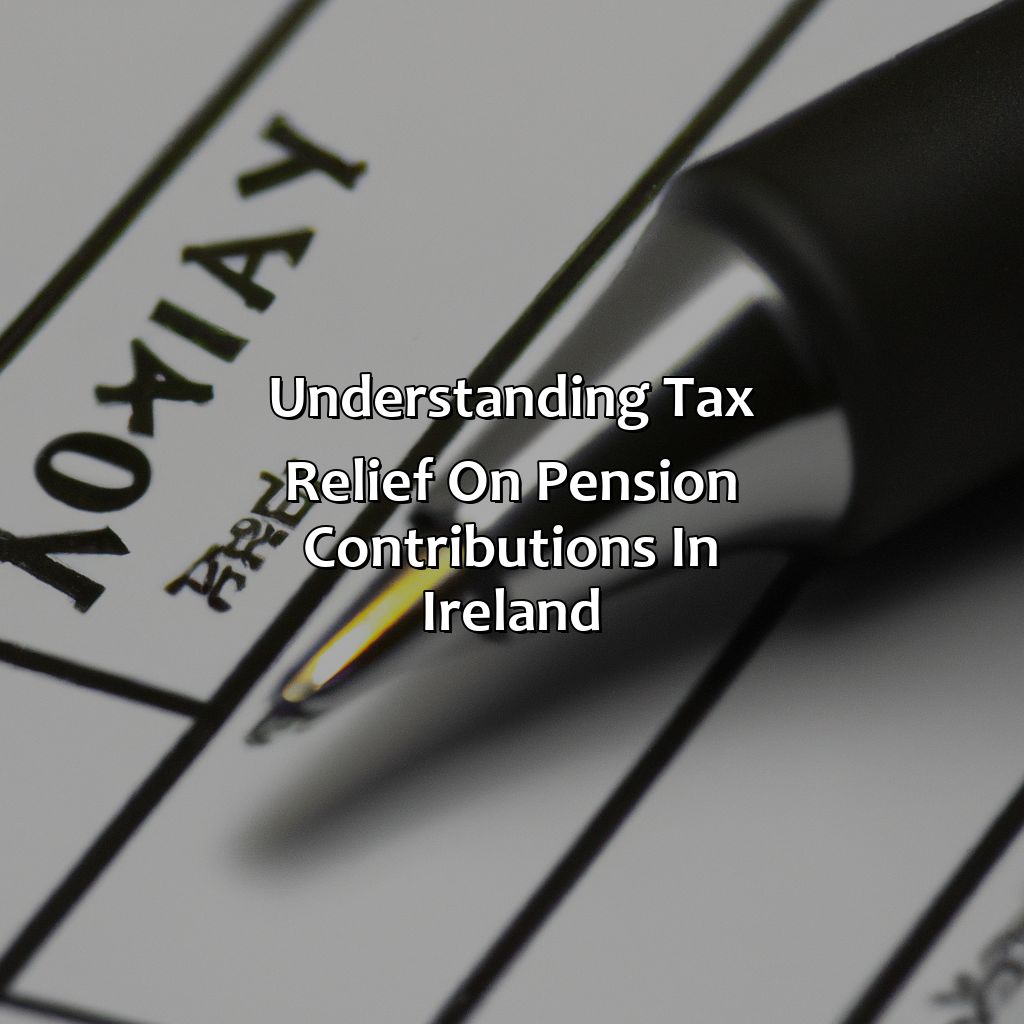
Image credits: retiregenz.com by Yuval Washington
Eligibility for tax relief on pension contributions
To qualify for tax relief on pension contributions in Ireland, one must meet certain conditions set by the government. These include being a resident or employed individual with income taxable in Ireland and contributing to a qualifying pension scheme. The amount contributed to the scheme and the age of the individual are also factors that determine eligibility.
Moreover, the tax relief provided is calculated at the individual’s marginal tax rate, subject to certain limits set by the government. The relief is capped based on the individual’s annual income and age, with younger individuals generally being eligible for a higher relief. The tax relief is also available for contributions made by the individual’s employer, subject to certain conditions.
It is important to note that the tax relief on pension contributions has a long history in Ireland, dating back to the 1970s when the government introduced the system to encourage individuals to save for retirement. Over the years, the government has made changes to the system to reflect the evolving needs of the population and the economy.
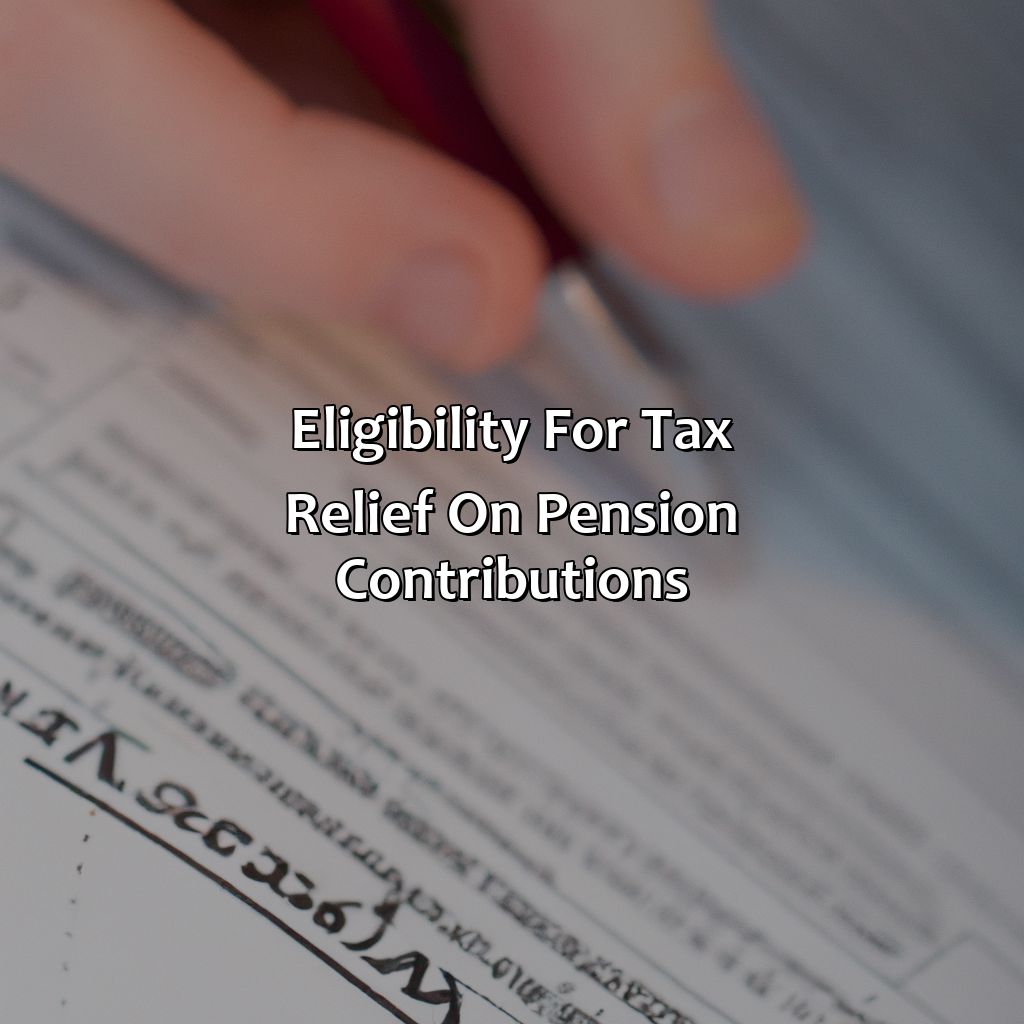
Image credits: retiregenz.com by Adam Arnold
How to claim tax relief on pension contributions in Ireland
Pension contributions in Ireland can offer significant tax relief to individuals.
Here’s a guide on how to claim tax relief on your pension contributions:
- Determine your maximum contribution limit based on your age and income level.
- Make a payment towards your pension plan.
- Obtain your pension provider’s statement, indicating the amount paid and the tax year it was paid in.
- Claim your tax relief by completing your tax return or contacting the Revenue Commissioners.
- Ensure the tax relief is credited to your tax account or pension plan.
It’s important to note that tax relief is limited to individuals under the age of 75 and is subject to certain restrictions. Additionally, those with a private pension plan may be eligible for further tax relief.
A colleague of mine, John, recently claimed tax relief on his pension contributions and received a substantial refund. He found the process to be straightforward and emphasizes the importance of regularly contributing to your pension plan.
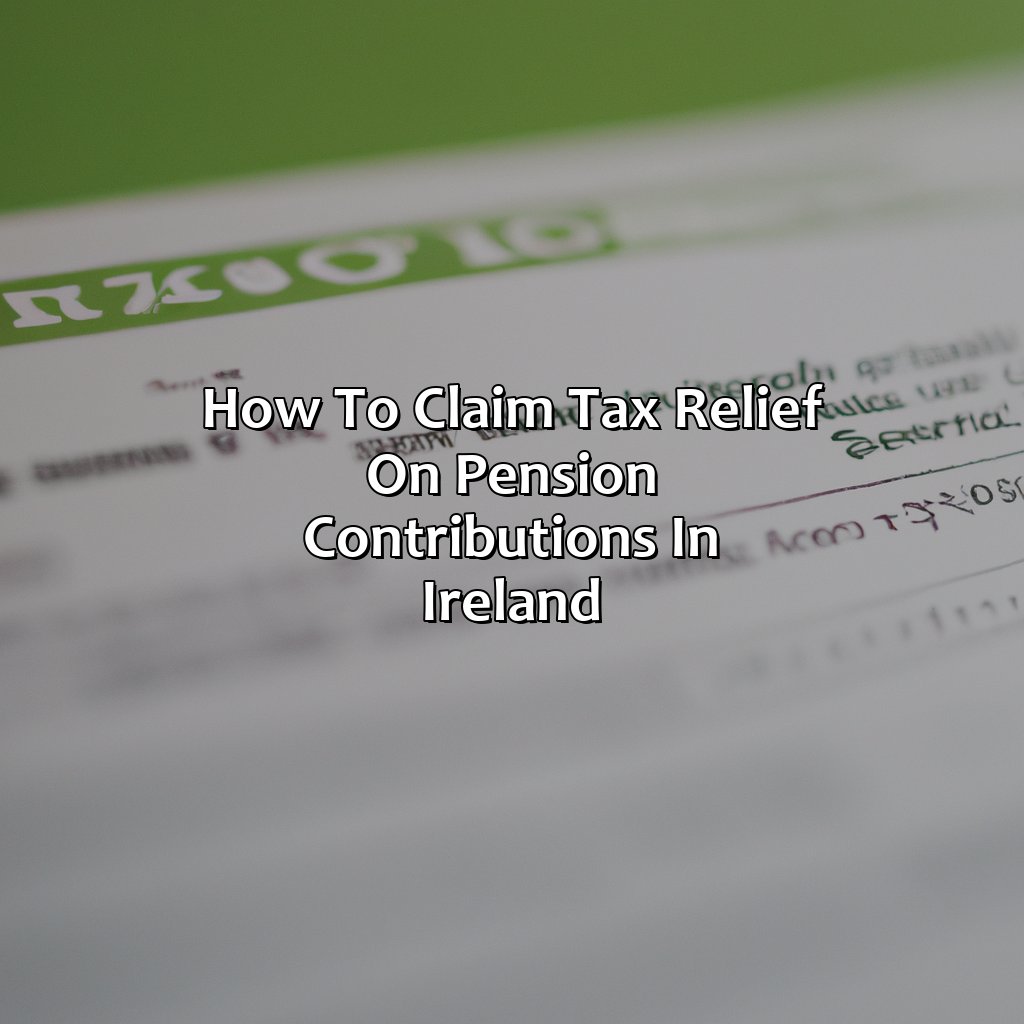
Image credits: retiregenz.com by Joel Jones
Timeframe for claiming tax relief on pension contributions
The Duration to Claim Tax Relief on Contributions for Pension
Tax relief can be claimed on pension contributions for the previous four years. This means that it is possible to claim tax relief for contributions made as far back as 2017. To claim relief, individuals need to complete the relevant tax returns for the relevant years. It is essential that the tax return is submitted before the deadline, which is usually the 31st of October in the following year.
It is worth noting that if an individual stops making pension contributions, their tax relief will automatically end. Therefore, it is crucial to continue making contributions to maintain eligibility for tax relief. Additionally, it is recommended to contribute sufficiently to maximize the tax relief available.
One way to ensure maximum relief is to opt for a net pay arrangement, whereby the employer deducts contributions from the employee’s salary before tax. This means that contributions are not subject to income tax or USC, resulting in higher net pay. Another way is to claim back tax relief on contributions made after tax, which can be done through a tax relief claim form.
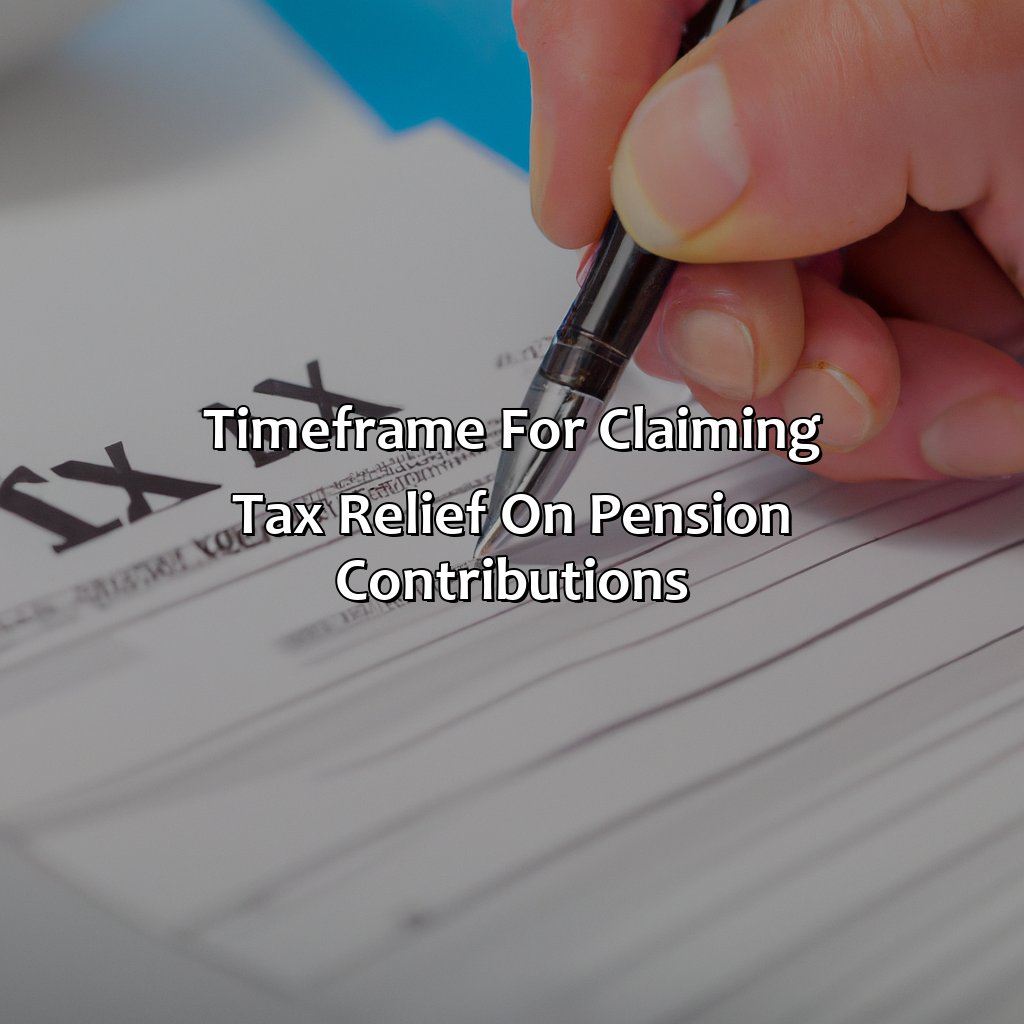
Image credits: retiregenz.com by Joel Woodhock
Five Facts About How To Claim Tax Relief On Pension Contributions Ireland:
- ✅ Pension contributions can be used to reduce your taxable income in Ireland. (Source: Revenue)
- ✅ You can claim tax relief on pension contributions as long as they do not exceed 25% of your income per year. (Source: Irish Times)
- ✅ You can claim tax relief on pension contributions made to a personal pension plan or an occupational pension scheme. (Source: Pensions Authority)
- ✅ To claim tax relief on pension contributions, you must fill out a Form 12 or Form 11 tax return. (Source: Citizen Information)
- ✅ The amount of tax relief you receive on pension contributions depends on your income tax rate and the amount of your contribution. (Source: Citizens Information)
FAQs about How To Claim Tax Relief On Pension Contributions Ireland?
How do I claim tax relief on pension contributions in Ireland?
To claim tax relief on your pension contributions in Ireland, you need to either fill out a Form 12 or a Form 11S. If you are self-employed, you will need to complete the Form 11S. If you are an employee, your employer will provide you with the Form 12. You can also claim tax relief on your pension contributions through the Revenue Online Service (ROS).
What’s the maximum amount of tax relief I can claim on my pension contributions in Ireland?
The maximum amount of tax relief you can claim on your pension contributions in Ireland depends on your age and income. However, the maximum amount of relief you can claim is 40% of your income or 115,000, whichever is lower.
What documents do I need to claim tax relief on my pension contributions in Ireland?
To claim tax relief on your pension contributions in Ireland, you will need to have proof of your contributions. This can be in the form of a receipt or a statement from your pension provider. You will also need to have your PPSN number and your tax credits and allowances.
Can I backdate my claim for tax relief on pension contributions in Ireland?
Yes, you can backdate your claim for tax relief on pension contributions in Ireland for up to 4 years.
Is there a deadline to claim tax relief on pension contributions in Ireland?
The deadline to claim tax relief on your pension contributions in Ireland is the 31st of December following the year in which the contributions were made. For example, you must claim tax relief for contributions made in 2021 by 31st December 2022.
Can I claim tax relief on pension contributions if I have already retired?
No, you cannot claim tax relief on pension contributions if you have already retired. Tax relief on pension contributions can only be claimed if you are paying into a pension scheme.
